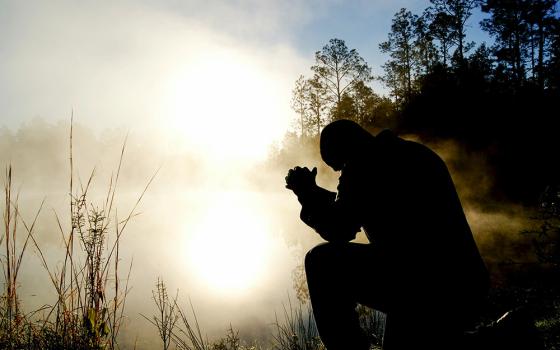
Jesuit Cardinal Michael Czerny, prefect of the Vatican's Dicastery for Promoting Integral Human Development, delivers a keynote address via video at the event “Synodality in America: People on the Move, Dialogue, and New Contexts,” a Portman Endowment eathering of the Ecclesia in America Network held at the University of San Diego. (Luis Donaldo González)
The massive deportation of undocumented migrants is incompatible with Catholic doctrine, said Jesuit Cardinal Michael Czerny, echoing the recently appointed archbishop of Washington, Cardinal Robert McElroy.
"Only one thing is necessary: to listen to what God is saying and to respond faithfully so as to journey as people of God called to build an ever wider 'we,' an ever-deeper fraternity," Czerny said. "Christians are called to remember that all goods and resources are universally destined."
Czerny, the head of the Dicastery for Promoting Integral Human Development, spoke via video to more than 70 theologians, pastors and ministers from North, Central and South America as keynote speaker at the bilingual conference "Synodality in America: People on the Move, Dialogue, and New Contexts," a Portman Endowment gathering of the Ecclesia in America Network held at the University of San Diego near the U.S.-Mexico border in California.
"In the United States, direct aid and accompaniment with migrants is now in danger because programs have been terminated, budgets frozen or canceled, staff dismissed," Czerny said on Feb. 7 during his address in Spanish.
"There is a real fear of persecution and prosecution," he continued.
Czerny emphasized that migration in the Americas is a "wounded reality" that Christians should not ignore.
"National security was ideologized and weaponized against the poor throughout the Americas," Czerny said. "For those of you who minister in the United States, I pray that your parishes and dioceses will be unafraid to walk with migrants."
"[Migrants] are a theophany, a revelation of God's active presence in history."
A round of applause interrupted Czerny's keynote when he favorably mentioned the explicit connection between truth and mercy that Episcopal Bishop Mariann Edgar Budde publicly made to President Donald Trump on Jan. 21.
Czerny highlighted poor governance and corruption, drug trafficking and increased violence, along with human rights violations, as causes that force people to flee their home countries.
"Major industrial forces continue to extract local resources and displace residents from their ancestral lands, especially Afro-descendent and Indigenous communities left unprotected by the local security forces," he said. "The corridors of death that multiply across our hemisphere and the whole globe reflect political failures: the dearth of imagination and lack of coordination."
Advertisement
"The Caribbean waters are becoming a cemetery, like the Mediterranean," Czerny, Pope Francis' delegate on immigration, continued. "Guantanamo Bay may once again become a large-scale migrant prison."
In addition, Czerny reminded those in attendance that the global migration context is developing collective traumas. "Like Rachel in the Scriptures who weeps for her people, parents are searching for their children who are no longer with them," he said.
To face the challenges of migration in the Americas, Czerny said that a multicultural and transdisciplinary dialogue is necessary to build bridges that become concrete forms of mutual aid.
"We have much to learn about local action from migrants themselves, who develop their own mutual aid networks," Czerny said. "Mutual aid is at the heart of migrant communities."
During his speech, Czerny strongly encouraged the continued creation and strengthening of local actions of hospitality. "Long-term conversion is integrally rooted in local life-giving actions," he said.
The pastoral initiatives and ministry of the Catholic Church "are living signs of hope for migrants who encounter hostility from hardhearted governments, the xenophobia of societies, and, at times, the indifference of religions," he added.
"There is a need for an interconfessional and interconvictional solidarity that unites across whatever differences exist."
At least five times, Czerny explicitly referred to the pastoral letter from the "Border Bishops and Bishops Responsible for Ministry with Migrants in North America, Central America, and the Caribbean" that came out in English and Spanish in November 2024.
"[That] letter lays out a coordinated pastoral approach so that the migrants, though passing through many jurisdictions, experience one church seamlessly accompanying them," Czerny said. "This could represent the pastoral ecclesiology or charter of a church truly without borders."
University of San Diego professor and conference organizer Victor Carmona said that the primary goal of the international gathering was to respond to Francis' invitation to build north-south bridges.
"Advancing theological reflections that nurture a synodal church across our continent is essential," Carmona told National Catholic Reporter. "It is a desire and a task that the participants in this gathering are up to."
Right before finishing his address, Czerny asked the attendants to continue walking with poor, migrant, displaced, persecuted and trafficked persons to read the signs of the times. "[That] is both pastoral and theological, and often ecumenical and interreligious."
"Let us recommit in our faith, beliefs and convictions to stay close to the displaced poor," Czerny concluded.





